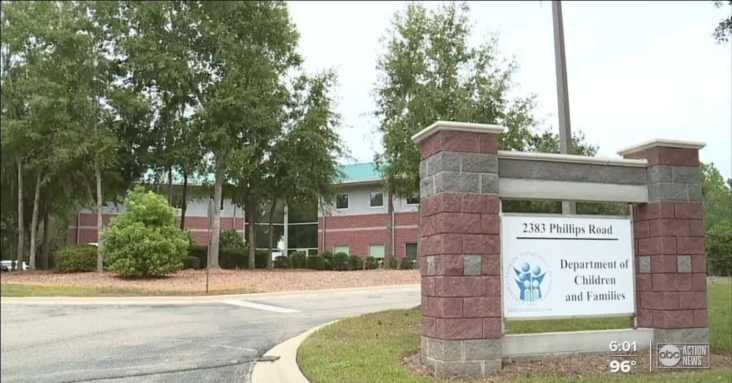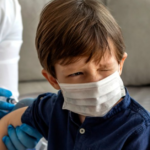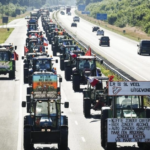
TAMPA, Fla. — With a small village of family members surrounding them, Taniyah and Rodney Williams shared, what they say, no loving parent should ever have to.
“They called us abusers and just took us from her,” Williams explained about the day her then-12-week-old daughter was taken by state child welfare workers after a nurse suspected her daughter was being abused.
The Williams now believe the system, created to protect families, not only failed them but distorted the truth to steal their daughter away from them and her biological family.
“I don’t know anything about her. What her favorite color is, her favorite show on TV, I don’t know anything,” said Williams about her daughter who she hasn’t seen since 2018.
The Williams are among four Florida families now suing Florida Governor Ron DeSantis and leaders of Florida’s Department of Children and Families (DCF) along with several other state foster care organizations.
In the lawsuit, filed in a Tallahassee federal court Wednesday, dozens of relatives across four families accused employees within the state’s foster care system of fabricating evidence, hiding and withholding key information, creating false abuse allegations, or ignoring state and federal family laws so the system workers could keep children from being placed with biological relatives and, instead, place them with system-connected people seeking children of their own.
For the Williams family, it all started in 2017 when their infant daughter showed signs of leg pain. According to the lawsuit, Williams had been in and out of her pediatrician’s office and the hospital over various medical issues involving her newborn daughter.
According to the lawsuit, her daughter’s birth was traumatic. The umbilical cord was wrapped around the baby’s neck, forcing doctors to break the baby’s clavicle during delivery to get her out, the complaint states. The baby’s birth also resulted in bruising, noted by the family’s pediatrician, court records show.
After the baby’s birth, the Williams’ made every doctor’s visit for their new daughter, the suit states. Mom had also been to the ER a few times over different issues with her daughter, including a respiratory infection. According to the 106-page complaint, the baby’s pediatrician never suspected abuse. In fact, he noted the baby has a form of brittle bone disease that made her bruise easily.
On the day the Williams brought their baby in over concerns about leg pain, doctors ordered x-rays which revealed the baby had a fractured femur and more than a dozen other fractures “in various stages of healing,” according to the lawsuit.
A nurse suspected abuse.
When parents lose custody, these families claim, relatives also lose their rights
Following the nurse’s suspicion, mom and dad were investigated by police. According to the lawsuit, the case was closed with no criminal charges filed.
Still, DCF filed a petition to remove the baby and her brother from their parents. The young parents were eventually stripped of their parental rights.
“It broke us, it changed us and it’s always going to be a part of us missing until she comes home,” said an emotional Williams.
“It ruined my life,” added dad, Rodney.
The couple vehemently denies they ever abused their children and are fighting to get their parental rights restored.
But their relatives said the system also broke the family by depriving biological relatives of their right to take custody of the baby.
According to the lawsuit, agencies within the state’s foster care system bypassed state and federal laws that require foster care workers to give relatives the opportunity to take custody of a child before placing that child with non-relative strangers.
On the day investigative reporter Katie LaGrone, and her photographer, Matthew Apthorp, met Taniyah and Rodney Williams, they also met more than a half dozen members who said they were each ready, willing, and able to take custody of the Williams’ daughter. But family members were, ultimately, disqualified for reasons they still don’t understand.
Relatives rejected
Paternal grandparents, Charlotte and Rodney Williams Sr., said they went through extensive background checks and were initially approved to take custody of the two Williams’ children.
“We passed all the home studies, they dug into our backgrounds,” said Williams Sr. “I’m in the military and the backgrounds we went through were just as bad,” he explained.
The grandparents said they were rejected at the last minute.
“They made up so many reasons,” said the paternal grandmother.
Lisa Crutch is the baby’s maternal grandmother and said, she too, was disqualified.
“I’m retired military, I worked for the city of New York, I have a college degree, there was nothing wrong with me having my granddaughter,” Crutch said.
The lawsuit alleged caseworkers “falsely claimed” Crutch was a child abuser who “had abused her son years earlier” and was even erroneously listed on the abuse registry as a child abuser.
According to Crutch. the paperwork, allegedly, stating she was a child abuser was riddled with spelling and factual errors. In addition, she said, the state labeled her son’s age at the time of his so-called abuse as “18 years old.” She also said system workers deliberately withheld information on how to get all corrected and removed from her background.
“I felt like it was conspiracy,” she said.
A conspiracy, the family now claims, was part of a bigger intent described in the lawsuit as “unlawful internal diversion” to let “operators of the system essentially have their choice of children placed into the state’s custody.”.
Why?
“Why would they do it,” asked Leigh Crutch, the baby’s great-aunt. “Because they’ve been doing it for so long and never expected to get caught,” she believes.
Crutch has been working behind the scenes, conducting her own investigation trying to get to the bottom of why her family is consistently being shut out of the young child’s life.
Crutch and other family members believe they discovered the why when they learned the baby taken from them had been fostered out to a family who had a strong connection to the foster care system. The foster father was, at the time, a board member and a foundation trustee for the same Clay County foster agency that fought to terminate Taniyah and Rodney Williams’ parental rights.
“I was furious,” said the baby’s biological mom. “I felt like it was a setup,” she said.
The Williams aren’t alone
“I can’t even describe the pain that we experienced as a family,” explained Judy Miller, who said, she and other family members were also unjustly disqualified from taking care of a baby relative who was also removed from her family.
Miller moved to Florida from Illinois to care for her granddaughter after her daughter and son-in-law’s parental rights were terminated over allegations of abuse.
While the baby’s biological parents deny they did anything wrong, Miller said she was one of eight family relatives ready, willing, and able to take custody of the baby, but who were all rejected by the system.
“They did two home studies and they were both approved,” Miller said of her attempts to gain custody of her granddaughter. Miller is also seeking legal action and named in the suit.
According to the complaint, caseworkers rejected Miller as a suitable guardian for her grandbaby because Miller’s “bond with her daughter was too close.”
Instead of family, the lawsuit states the baby was placed with a stranger, “system-connected.”
“You can’t write off the whole family,” said Anna DaCosta and her husband.
Their daughter’s half-sister was also removed from their biological family because DCF, against committee recommendations according to the complaint, placed the young girl with a non-relative, foster-system connected person after the baby’s mother lost her parental rights.
“She was a pretty little blond-haired, blue-eyed baby. Of course they wanted her,” said DaCosta.
“It’s happening all over Florida”
“It’s happening all over Florida,” said attorney Octavia Brown of Community Law for Families and Children. She’s part of a team of attorneys who filed the complaint.
When LaGrone suggested the lawsuit accused kidnapping by and within the system, Brown responded “what else do you call it? If there is someone who is connected to the system and they see a child that they want, they are going to get the child.”
Brown is also a former insider who worked as an attorney for DCF and other agencies representing Florida’s foster care system.
While Brown believes the system, overall, protects children from abuse, she explained how some staff members who collaborate to deliberately keep a child from being placed with biological relatives can get away with it.
“This system is so bogged down”, she said. “When they [system staff] come in with these false stories or they come in with false allegations of caregivers having backgrounds, the judge is not going to say ‘oh let me look into that home study or let me look into that criminal record,” she explained.
Brown said young parents and poor families are most vulnerable to what they dub as “internal diversion” practices.
“Because those families don’t have the money to fight the bogus allegations,” Brown said.
Board member adopts baby
Today, Taniyah and Rodney Williams are parents to a little boy. Their older son, who was taken away from them at the same time their baby daughter was removed, was placed with his paternal grandparents.
But their only daughter wasn’t. She remains gone from the family after being adopted three years ago by the same board member and his family who first took her in.
In response to questions about the adoption and potential conflict of interest, the now-former board member stated in an email, “I would certainly like to speak to you regarding our daughter. I’m sure you’ve heard several fabulous stories which are not true,” he said.
The board member never elaborated because his attorney wouldn’t let him. Custody cases are, by law, confidential and can’t be publicly discussed according to his attorney.
The system responds
According to a Department of Children and Families dashboard, over 21,000 children and young adults are currently in the state’s foster care system. To get some additional perspective, we referred to DCF’s most annual performance report, from fiscal year 2020-2021. According to the report, the number of children entering the foster care system in Florida is slightly above the national average – with above 3.5 children per 1,000 entering Florida’s system in 2019, compared to 3.4 children per 1,000 nationally.
In response to the lawsuit, DCF spokesperson Laura Walthall sent us the following statement:
While you probably won’t include any of our successes, it is important to highlight the Department of Children and Families continue to make the well-being of children our top priority. As a system of care, we work to exhaust all effort to find a relative or non-relative caregiver for children who are removed from their biological parents. Our goal is family preservation whenever possible. In fact, over the last couple of years, we have invested significant resources in achieving that goal and we can attest that Florida is at an 18-year low for removal from family caregivers. Florida has also invested millions of dollars over the last three years to improve family placements.
We remain committed to ensuring the integrity of our mission: to work in partnership with local communities to protect the vulnerable, promote strong and economically self-sufficient families, and advance personal and family recover and resiliency.
But the Williams’, and three other Florida families named in the lawsuit, maintain that was not their experience. Now, they’re hoping the justice system can do what, they believe, the state’s child welfare system went out of its way and against the law not to— bring these children back home to them.
“She’s a black child, raised in a white household and she’s going to find out that she was stolen and stolen from an excellent family, “ said great-aunt Leigh Crutch about the Williams’ daughter.
“The system is a lie, that’s what it is,” the baby’s mom said.



